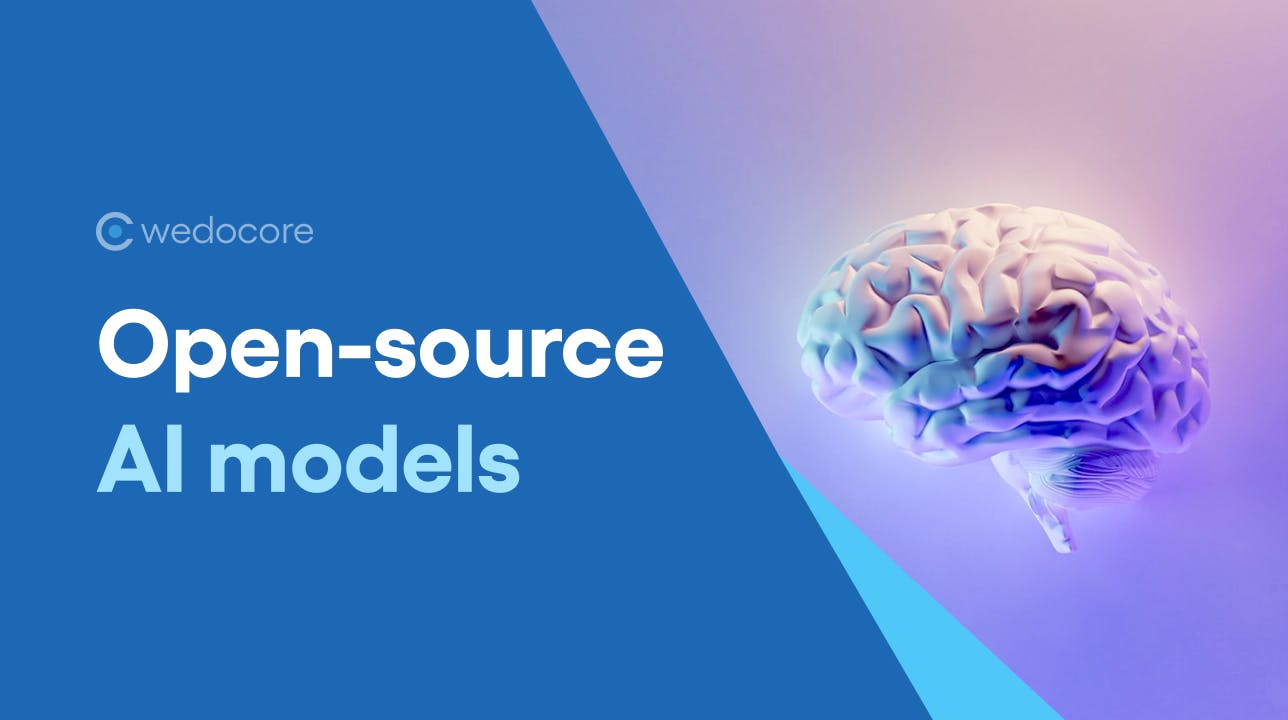10 Open-Source AI Platforms for Innovation


Written by
Published on
Artificial Intelligence and Open-Source
Artificial Intelligence (AI) is no longer just a futuristic concept; it's a pivotal part of our current technological landscape. AI's integration into various sectors—healthcare, finance, education, and more—has been significantly accelerated by the open-source movement. This movement has democratized AI development, making powerful tools and technologies accessible to developers and organizations worldwide. As AI continues to evolve, open-source platforms play a critical role in fostering innovation, collaboration, and transparency in AI research and development.
The Rise of Open-Source AI
The open-source model, characterized by freely available and modifiable source code, has revolutionized the way we develop, distribute, and utilize software. In the realm of AI, open-source platforms have been instrumental in facilitating rapid innovation, allowing for the collaborative development of sophisticated AI tools and algorithms. Platforms such as GitHub and GitLab have become hubs for AI projects, enabling developers to share their work, collaborate with others, and contribute to the advancement of AI technologies.
Expanding the section on key open-source AI frameworks and tools requires a deeper dive into each platform, including their strengths, weaknesses, and the unique value they offer to the AI community. By providing a more detailed analysis, we aim to offer valuable insights for developers, researchers, and organizations considering these tools for their projects. Additionally, incorporating more links throughout the text will provide readers with direct access to further information and resources.
Key Open-Source AI Frameworks and Tools
The landscape of open-source AI is rich and diverse, with numerous frameworks and tools designed to meet the varied needs of the AI development community. Below, we delve into some of the most influential open-source AI frameworks and tools, highlighting their capabilities, strengths, and potential drawbacks.
1. TensorFlow
TensorFlow stands out as a highly versatile open-source machine learning framework developed by Google. It facilitates the creation and deployment of machine learning and deep learning models across a wide array of platforms, from desktops to edge devices.
-
Strengths:
- Extensive support for deep learning and neural networks.
- Robust scalability across CPUs, GPUs, and TPUs.
- Wide adoption in both academia and industry, resulting in a large community and ecosystem.
- Comprehensive suite of tools for research and production, including TensorFlow Lite for mobile and embedded applications.
-
Weaknesses:
- The complexity of its comprehensive API can be daunting for newcomers.
- Transitioning from research prototypes to production systems sometimes requires significant effort.
2. PyTorch
PyTorch is celebrated for its dynamic computational graph and user-friendly interface, making it a favorite among researchers for experiments and prototyping.
-
Strengths:
- Dynamic computation graph enhances flexibility and ease of debugging.
- Strong GPU acceleration support.
- Integrated with Python, facilitating the use of additional Python libraries.
- Continuous growth in community and resources, with extensive support from academic and industrial sectors.
-
Weaknesses:
- Although improving, the transition to production environments is less streamlined compared to TensorFlow.
3. Keras
Keras serves as a high-level neural networks API, running on top of TensorFlow, Theano, and Microsoft Cognitive Toolkit (CNTK), designed for fast experimentation.
-
Strengths:
- Highly user-friendly and modular, making deep learning accessible.
- Supports both convolutional networks and recurrent networks, as well as combinations of the two.
- Easily extendable with new modules as needed by the user.
-
Weaknesses:
- Being a high-level API, it offers less flexibility for complex model design compared to its underlying frameworks.
4. OpenAI
OpenAI focuses on ensuring that artificial general intelligence (AGI) benefits all of humanity. They are known for their cutting-edge research and development in AI.
-
Strengths:
- Leading research in AGI and reinforcement learning.
- Development of influential models like GPT-3, which have set new standards in natural language processing.
- Strong commitment to AI safety and ethics.
-
Weaknesses:
- Some of their advanced models and tools are not fully open-source, limiting accessibility for the broader community.
5. Rasa
Rasa is an open-source machine learning framework for automated text and voice-based conversations, focusing on building chatbots.
-
Strengths:
- Provides a comprehensive set of tools for building sophisticated chatbot functionalities.
- Strong support for conversational AI, enabling the development of context-aware, personalized chatbots.
- Active and growing community, with good documentation and resources.
-
Weaknesses:
- Requires a steep learning curve to fully utilize its advanced features.
6. Amazon SageMaker
Amazon SageMaker simplifies the machine learning model development cycle, enabling developers and data scientists to quickly build, train, and deploy machine learning models at scale.
-
Strengths:
- Integrated with AWS, providing easy access to a wide range of cloud services.
- Offers a fully managed environment, significantly reducing the infrastructure management burden.
- Supports almost all machine learning algorithms and frameworks.
-
Weaknesses:
- Being a proprietary service, it may lead to vendor lock-in.
- The cost can escalate quickly with extensive use of cloud resources.
7. Apache MXNet
Apache MXNet is a scalable deep learning framework, supported by AWS, that's designed for efficiency and flexibility.
-
Strengths:
- Supports a broad spectrum of languages including Python, C++, and R.
- Efficient performance, particularly in terms of speed and memory consumption.
- Flexible design accommodating both imperative and symbolic programming.
-
Weaknesses:
- Lesser community support compared to TensorFlow and PyTorch.
- Documentation and learning resources are not as comprehensive.
8. Scikit-learn
Scikit-learn is a Python library for machine learning, known for its simple
and efficient tools for data analysis and modeling.
-
Strengths:
- Wide variety of algorithms for classification, regression, clustering, and dimensionality reduction.
- Excellent documentation and community support.
- Integrates seamlessly with other Python scientific libraries (NumPy, SciPy, Matplotlib).
-
Weaknesses:
- Primarily focused on traditional machine learning, with limited capabilities for deep learning or complex neural network architectures.
9. OpenCV
OpenCV is an open-source computer vision and machine learning software library, offering over 2500 optimized algorithms for image and video analysis.
-
Strengths:
- Extensive collection of algorithms for real-time computer vision.
- Cross-platform and supports multiple programming languages including Python, C++, and Java.
- Strong community support and comprehensive documentation.
-
Weaknesses:
- The vast scope of the library can make it challenging to navigate for beginners.
- Some areas, especially newer domains of computer vision, may lack depth compared to specialized frameworks.
10. H2O.ai
H2O.ai offers an open-source, distributed in-memory machine learning platform with linear scalability. It supports a wide range of popular algorithms for data analysis.
-
Strengths:
- User-friendly interface for non-programmers, with AutoML features for automatic training and tuning of models.
- Robust support for enterprise-grade features and integration.
- Strong community and commercial support, with extensive documentation and resources.
-
Weaknesses:
- While powerful, it may require a steep learning curve for deeper customization and optimization.
Advantages of Open-Source AI
The open-source approach to AI development offers several key advantages:
- Collaboration and Innovation: Open-source projects encourage collaboration among developers, researchers, and organizations, fostering innovation and rapid advancement in AI technologies.
- Accessibility and Diversity: By making AI tools and algorithms openly available, open-source AI promotes diversity in development and application, ensuring a wider range of perspectives and solutions.
- Transparency and Trust: Open-source AI projects are transparent, allowing users to examine, modify, and understand the code behind AI models, which builds trust and facilitates the ethical use of AI.
Challenges and Considerations
Despite the benefits, the open-source AI ecosystem faces challenges such as:
- Quality Control and Standardization: The open and collaborative nature of open-source projects can lead to issues with code quality and standardization.
- Security and Privacy: Open-source AI tools may present security vulnerabilities that could be exploited if not properly managed.
- Sustainability: Ensuring the long-term sustainability of open-source AI projects requires ongoing support and funding.
Wedocore's Role in the Open-Source AI Ecosystem
Wedocore, a consulting company, plays a crucial role in navigating the complexities of the open-source AI landscape. By providing expertise in AI strategy, development, and implementation, Wedocore helps organizations leverage the power of open-source AI to drive innovation and achieve competitive advantages. Through services such as AI consulting, custom AI solution development, and open-source AI integration, Wedocore empowers businesses to harness the potential of AI technologies effectively and ethically.
How Wedocore Enhances AI Adoption
- Expert Guidance: Wedocore offers expert guidance on selecting and implementing the right open-source AI tools and frameworks to meet specific business needs.
- Custom AI Solutions: Tailoring AI solutions to fit unique organizational requirements, Wedocore helps businesses innovate and improve efficiency.
- Ethical AI Practices: Emphasizing the importance of ethical AI, Wedoc
ore advises on best practices for transparent, responsible, and equitable AI development and usage.
Future Directions of Open-Source AI
The future of open-source AI is promising, with ongoing advancements in AI technologies and growing community support. Emerging trends to watch include:
- AI for Social Good: Increasing focus on using AI to address societal challenges, such as healthcare, education, and environmental sustainability.
- AutoML and AI Accessibility: Developments in automated machine learning (AutoML) aim to make AI more accessible to non-experts, democratizing AI development.
- Ethical and Responsible AI: Growing emphasis on ethical considerations in AI, including fairness, transparency, and accountability, to ensure responsible development and deployment of AI technologies.
Conclusion
The symbiotic relationship between AI and the open-source movement is reshaping the technological landscape, driving innovation, and fostering a collaborative global community. As AI continues to advance, the role of open-source platforms and the contributions of companies like Wedocore will be instrumental in harnessing the full potential of AI technologies for the betterment of society.
For more information on how Wedocore can help your organization navigate the open-source AI landscape, visit Wedocore's website.
Additional Resources
To explore more about AI and open-source technologies, consider the following resources:
- Deep Learning: An online book by Ian Goodfellow, Yoshua Bengio, and Aaron Courville, offering comprehensive coverage of deep learning.
- Fast.ai: A research group that provides free resources and courses to help people learn deep learning.
- AI Ethics Guidelines: The OECD Principles on AI promote artificial intelligence that is innovative and trustworthy and that respects human rights and democratic values.
- Kaggle: A platform for data science competitions, offering datasets and a community for AI enthusiasts and professionals.
Through the combined efforts of the open-source community and AI consulting firms like Wedocore, the future of AI looks bright, with endless possibilities for innovation and positive impact on the world.